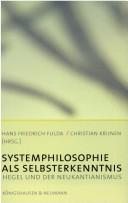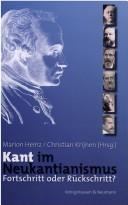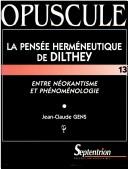| Listing 1 - 10 of 13 | << page >> |
Sort by
|
Book
Year: 1904 Publisher: Louvain : Paris : Institut supérieur de Philosophie ; Félix Alcan,
Abstract | Keywords | Export | Availability | Bookmark
 Loading...
Loading...Choose an application
- Reference Manager
- EndNote
- RefWorks (Direct export to RefWorks)
Néokantisme. --- Renouvier, Charles --- Critique et interprétation.
Book
ISBN: 9781107032576 9781139506717 Year: 2015 Publisher: Cambridge Cambridge University Press
Abstract | Keywords | Export | Availability | Bookmark
 Loading...
Loading...Choose an application
- Reference Manager
- EndNote
- RefWorks (Direct export to RefWorks)
Theory of knowledge --- Neo-kantianism. --- Néo-kantisme --- Néokantisme --- Néo-kantisme --- Néokantisme.

ISBN: 3826032799 9783826032790 Year: 2006 Volume: 7 Publisher: Würzburg: Königshausen und Neumann,
Abstract | Keywords | Export | Availability | Bookmark
 Loading...
Loading...Choose an application
- Reference Manager
- EndNote
- RefWorks (Direct export to RefWorks)
Néokantisme --- Hegel, Georg Wilhelm Friedrich --- Hegel, Georg Wilhelm Friedrich,
Book
ISBN: 9782406106845 Year: 2021 Publisher: Paris : Classiques Garnier,
Abstract | Keywords | Export | Availability | Bookmark
 Loading...
Loading...Choose an application
- Reference Manager
- EndNote
- RefWorks (Direct export to RefWorks)
Ce livre étudie l’occurrence ou non d’un diallèle dans l’entreprise kantienne de fondation de la connaissance. La réponse à cette question engage un commentaire de la déduction transcendantale des catégories, au cœur de la Critique de la raison pure, dans son écriture de 1781 puis de 1787.
Kantisme. --- Philosophie --- Théorie de la connaissance --- Néokantisme --- Phénoménologie

ISBN: 3826032993 9783826032998 Year: 2006 Volume: 23 Publisher: Würzburg: Königshausen und Neumann,
Abstract | Keywords | Export | Availability | Bookmark
 Loading...
Loading...Choose an application
- Reference Manager
- EndNote
- RefWorks (Direct export to RefWorks)
Neo-kantianism --- Néo-kantisme --- Néo-kantisme --- Congresses. --- Congrès --- Kant, Immanuel, --- Néokantisme
Book
Abstract | Keywords | Export | Availability | Bookmark
 Loading...
Loading...Choose an application
- Reference Manager
- EndNote
- RefWorks (Direct export to RefWorks)
Néokantisme --- --Herméneutique --- --Phénoménologie --- --Theory of knowledge --- Theory of knowledge --- Herméneutique --- Phénoménologie
Book
ISBN: 9783826037269 382603726X Year: 2008 Publisher: Würzburg : Königshausen & Neumann,
Abstract | Keywords | Export | Availability | Bookmark
 Loading...
Loading...Choose an application
- Reference Manager
- EndNote
- RefWorks (Direct export to RefWorks)
Néokantisme --- Hegel, Georg Wilhelm Friedrich --- Hegel, Georg Wilhelm Friedrich, --- Système (philosophie)
Book
ISBN: 9780199696543 9780191756917 0199696543 Year: 2015 Volume: *25 Publisher: Oxford : Oxford university press,
Abstract | Keywords | Export | Availability | Bookmark
 Loading...
Loading...Choose an application
- Reference Manager
- EndNote
- RefWorks (Direct export to RefWorks)
This volume is divided into four parts. The first Part explores individual philosophers, including Fichte, Hegel, Kierkegaard, and Nietzsche, amongst other great thinkers of the period. The second addresses key philosophical movements: Idealism, Romanticism, Neo-Kantianism, and Existentialism. The essays in the third Part engage with different areas of philosophy that received particular attention at this time, including philosophy of nature and of science, philosophy of mind and language, the philosophy of education, and the relationship between philosophy and science, or Wissenschaft (a German term that is famously less narrowly restricted to natural science and disciplines modeled on it than its English counterpart). Finally, the contributors turn to discuss central philosophical topics, from skepticism to materialism, from dialectics to ideas of historical and cultural Otherness, and from the reception of antiquity to atheism.
History of philosophy --- anno 1800-1899 --- Germany --- Philosophie --- Néokantisme --- Marx, Karl, --- Allemagne --- Histoire --- Philosophy, German --- E-books --- Filosofi --- Filosofie. --- Philosoph. --- Philosophie. --- Philosophy, German. --- Historia. --- 1800-1899. --- 1800-talet. --- Deutschland. --- Duitsland. --- Tyskland. --- Néokantisme. --- Marx, Karl

ISBN: 9782859397753 2859397752 Year: 2002 Publisher: Villeneuve-d'Ascq : Presses universitaires de Septentrion,
Abstract | Keywords | Export | Availability | Bookmark
 Loading...
Loading...Choose an application
- Reference Manager
- EndNote
- RefWorks (Direct export to RefWorks)
Book
ISBN: 9782130855668 2130855660 Year: 2024 Publisher: Paris : Puf,
Abstract | Keywords | Export | Availability | Bookmark
 Loading...
Loading...Choose an application
- Reference Manager
- EndNote
- RefWorks (Direct export to RefWorks)
"Trois cents ans après sa naissance, Kant reste l'un des rares philosophes auxquels toute pensée au présent doit, à un moment ou un autre, se confronter. Il y a du Kant, approprié ou récusé, dans les problèmes, thèses et débats d'aujourd'hui. Son actualité ne signifie pas nécessairement la permanence de la pertinence de ses analyses. Elle désigne le fait qu'il se trouve engagé dans et par les questionnements présents. L'actualité de Kant est celle d'un Kant depuis aujourd'hui, celle d'un Kant contemporain. Et il est tout aussi contemporain dans son inactualité : c'est dans son écart à notre présent qu'il peut servir à le manifester, comme il peut inquiéter ses évidences et peut-être l'ouvrir à son avenir. Cet ouvrage rassemble huit contributions consacrées à cette (in)actualité de Kant. Elles envisagent les positions kantiennes qui permettent d'éclairer certaines discussions de notre temps, qui elles-mêmes nourrissent des lectures renouvelées du philosophe. Elles s'intéressent par ailleurs à la manière dont le rapport contemporain à Kant peut prendre la forme d'un retour, qu'il s'agisse d'un retour de Kant, d'un retour à Kant, d'un retour critique sur Kant, voire d'un recours à lui."--Back cover.
Kantisme. --- Néokantisme. --- Kant, Immanuel --- Critique et interprétation --- Kant, Immanuel, --- Criticism and interpretation --- Criticism and interpretation. --- Philosophy, German --- Kant, Immanuel, 1724-1804 --- Influence (Literary, artistic, etc.). --- Influence.
| Listing 1 - 10 of 13 | << page >> |
Sort by
|

 Search
Search Feedback
Feedback About UniCat
About UniCat  Help
Help News
News